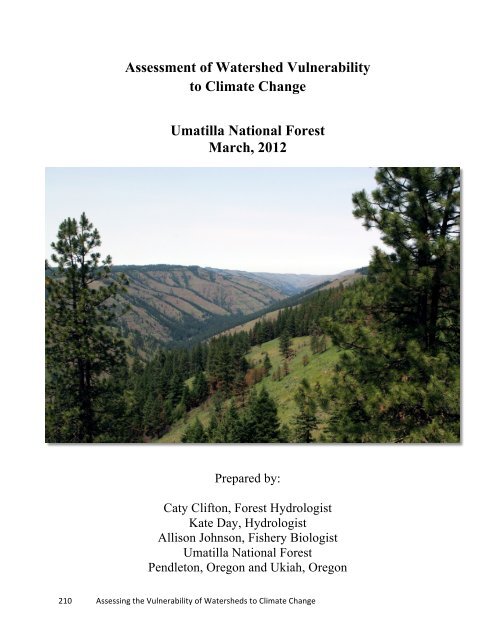watervulnerability
watervulnerability watervulnerability
Assessment of Watershed Vulnerability to Climate Change Umatilla National Forest March, 2012 Prepared by: Caty Clifton, Forest Hydrologist Kate Day, Hydrologist Allison Johnson, Fishery Biologist Umatilla National Forest Pendleton, Oregon and Ukiah, Oregon 210 Assessing the Vulnerability of Watersheds to Climate Change
Umatilla National Forest Watershed Vulnerability Assessment, Pacific Northwest Region (R6) BACKGROUND AND FOREST CONTEXT National Forests across the country are evaluating the risk posed by climate change to important water resources on the forests and adjoining lands. These evaluations are focused on climate-induced hydrologic change, impacts on water diversions and aquatic species, and interactions with infrastructure. These Watershed Vulnerability Assessments (WVAs) provide real world examples of issue-based and landscape-specific approaches to assessing the vulnerability of national forest watersheds and resources to climatic changes, and planning and implementing effective adaptation. The general intent is to display, for managers, the relative vulnerability of watersheds to climate change, and identify watersheds containing water “values,” or systems that may be susceptible to changes in hydrologic conditions (Hurd et al. 1999; Furniss et al. 2010). On the Umatilla National Forest (UNF), vulnerability was considered at the following two landscape and issue scales. 1. Forestwide at the HU12 scale (162 subwatersheds have UNF ownership from
- Page 164 and 165: Sawtooth National Forest Watershed
- Page 166 and 167: Sawtooth National Forest Watershed
- Page 168 and 169: Sawtooth National Forest Watershed
- Page 170 and 171: Sawtooth National Forest Watershed
- Page 172 and 173: Sawtooth National Forest Watershed
- Page 174 and 175: Sawtooth National Forest Watershed
- Page 176 and 177: Sawtooth National Forest Watershed
- Page 178 and 179: Sawtooth National Forest Watershed
- Page 180 and 181: Sawtooth National Forest Watershed
- Page 182 and 183: Sawtooth National Forest Watershed
- Page 184 and 185: Sawtooth National Forest Watershed
- Page 186 and 187: Sawtooth National Forest Watershed
- Page 188 and 189: Sawtooth National Forest Watershed
- Page 190 and 191: Shasta Trinity National Forest Wate
- Page 192 and 193: Shasta Trinity National Forest Wate
- Page 194 and 195: Shasta Trinity National Forest Wate
- Page 196 and 197: Shasta Trinity National Forest Wate
- Page 198 and 199: Shasta Trinity National Forest Wate
- Page 200 and 201: Shasta Trinity National Forest Wate
- Page 202 and 203: Shasta Trinity National Forest Wate
- Page 204 and 205: Shasta Trinity National Forest Wate
- Page 206 and 207: Shasta Trinity National Forest Wate
- Page 208 and 209: Shasta Trinity National Forest Wate
- Page 210 and 211: Shasta Trinity National Forest Wate
- Page 212 and 213: Shasta Trinity National Forest Wate
- Page 216 and 217: Umatilla National Forest Watershed
- Page 218 and 219: Umatilla National Forest Watershed
- Page 220 and 221: Umatilla National Forest Watershed
- Page 222 and 223: Umatilla National Forest Watershed
- Page 224 and 225: Umatilla National Forest Watershed
- Page 226 and 227: Umatilla National Forest Watershed
- Page 228 and 229: Umatilla National Forest Watershed
- Page 230 and 231: Assessment of Watershed Vulnerabili
- Page 232 and 233: Ouachita National Forest Watershed
- Page 234 and 235: Ouachita National Forest Watershed
- Page 236 and 237: Ouachita National Forest Watershed
- Page 238 and 239: Ouachita National Forest Watershed
- Page 240 and 241: Assessment of Watershed Vulnerabili
- Page 242 and 243: Chequamegon-‐Nicolet National F
- Page 244 and 245: Chequamegon-‐Nicolet National F
- Page 246 and 247: Chequamegon-‐Nicolet National F
- Page 248 and 249: Chequamegon-‐Nicolet National F
- Page 250 and 251: Chequamegon-‐Nicolet National F
- Page 252 and 253: Chequamegon-‐Nicolet National F
- Page 254 and 255: Chequamegon-‐Nicolet National F
- Page 256 and 257: Chequamegon-‐Nicolet National F
- Page 258 and 259: Chequamegon-‐Nicolet National F
- Page 260 and 261: Chequamegon-‐Nicolet National F
- Page 262 and 263: Chequamegon-‐Nicolet National F
Assessment of Watershed Vulnerability<br />
to Climate Change<br />
Umatilla National Forest<br />
March, 2012<br />
Prepared by:<br />
Caty Clifton, Forest Hydrologist<br />
Kate Day, Hydrologist<br />
Allison Johnson, Fishery Biologist<br />
Umatilla National Forest<br />
Pendleton, Oregon and Ukiah, Oregon<br />
210 Assessing the Vulnerability of Watersheds to Climate Change



